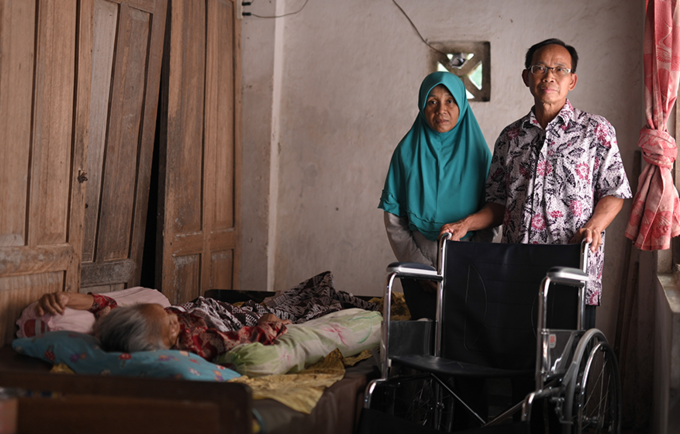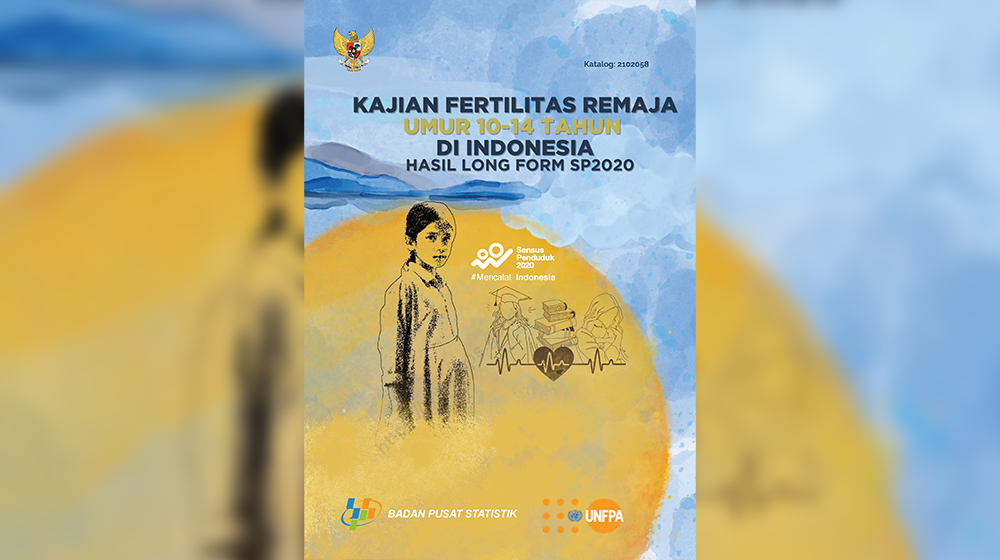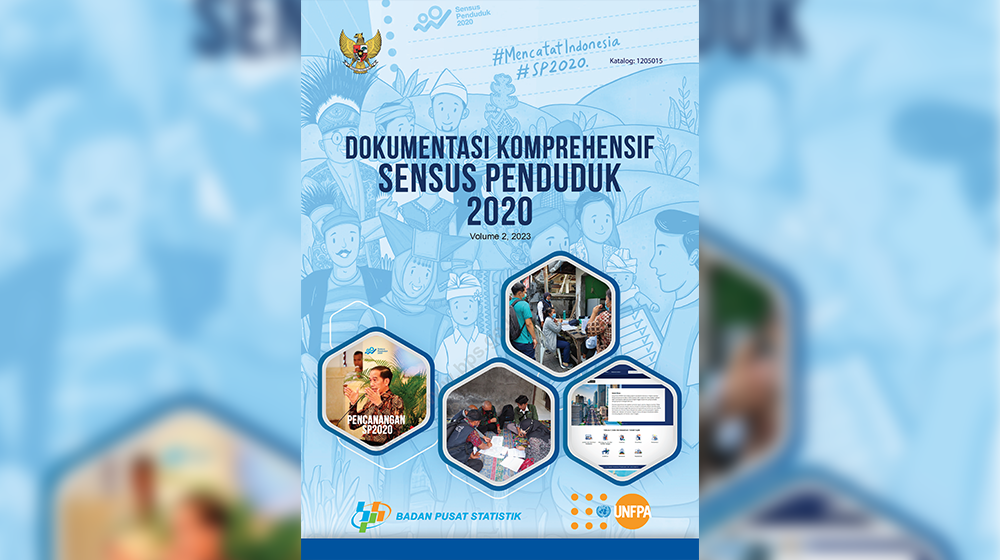The COVID-19 pandemic has brought widespread, adverse impacts to all populations, including older persons. As of 15 March 2022, persons aged 60 and over make up 12 percent of the total COVID-19 confirmed cases in Indonesia. Nearly half of deaths due to COVID-19 have also happened to older persons, positioning them among the most vulnerable groups in the pandemic.
At the same time, Indonesia has also seen an increase in the percentage of older persons. According to the BPS-Statistics Indonesia’s data in 2021, there are 29,82 million older persons in Indonesia, making up 10,82% of the national population. BPS-Statistics Indonesia also recorded a trend of increasing life expectancy rate from 2012-2021, from 70.2 years to 73.5 years.
“The 2021 Older Persons Population Statistics shows that the number of older persons in Indonesia has reached 10.82 percent,” DR. (H.C.) dr. Hasto Wardoyo, Sp.OG(K), the Chief of the National Population and Family Planning Board (BKKBN) stated. “With that proportion, this country has entered the phase of an ageing population structure,” he affirmed.
To develop inclusive development programs and policies for older persons in the pandemic context, BKKBN and the United Nations Population Fund (UNFPA) launched the results of a national study on the impact of the COVID-19 pandemic on older persons, including those with disabilities in July 2022 in Bandung, West Java.
Through UNFPA’s Leaving No One Behind (LNOB) programme supported by the Government of Japan, an inclusive COVID-19 response targeting the furthest left behind population groups, BKKBN led the national study. With experts on older persons-cum-economists, Professor Yasuhiko Saito from the Economic Research Institute for ASEAN and East Asia (ERIA) and Dr. Lilis Heri Mis Cicih from Universitas Indonesia who led the research, BKKBN trained and deployed 365 older person cadres as the enumerators who collected the data from nearly 9,000 respondents in 19 cities and 21 districts across ten provinces of Indonesia.
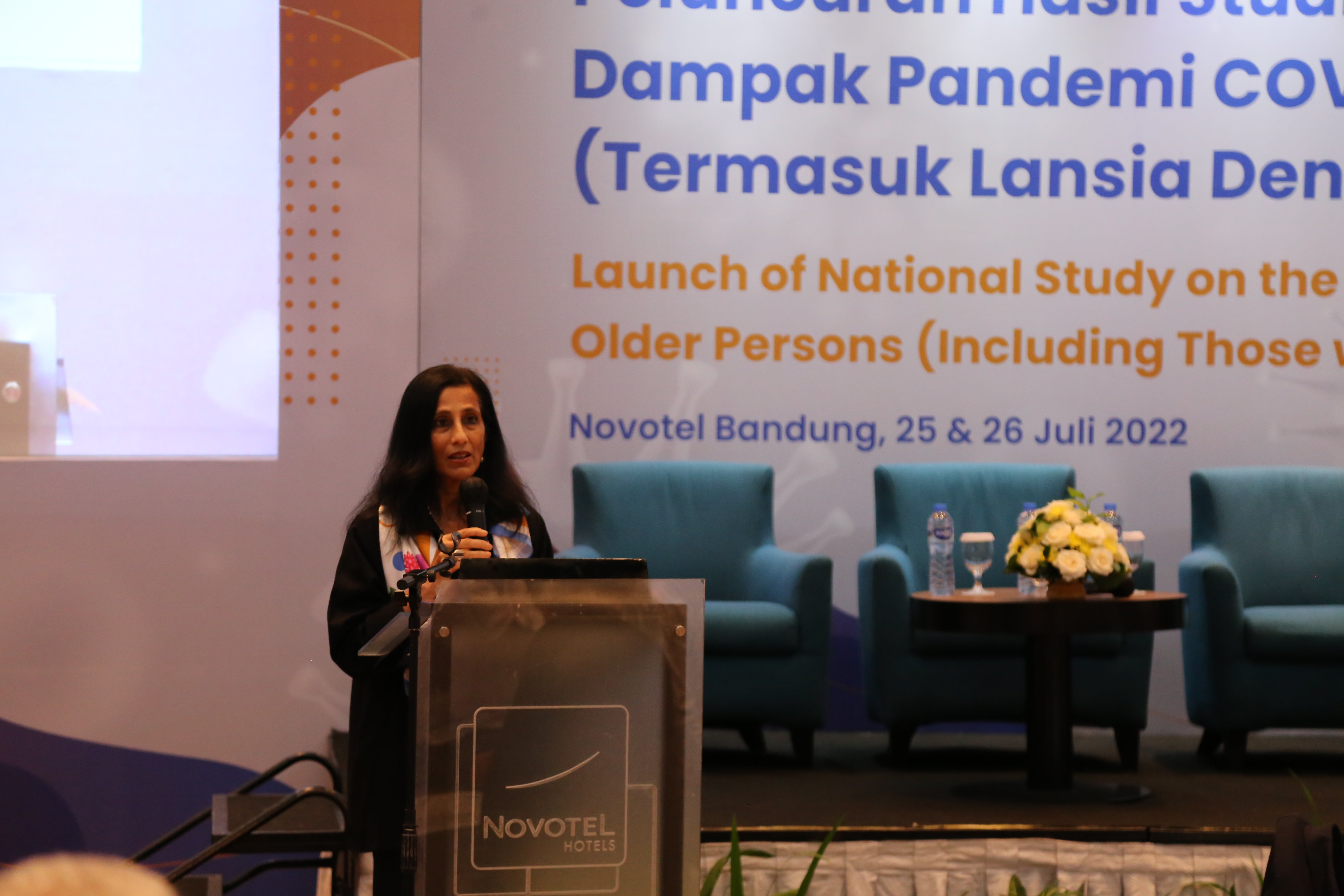
(Photo: Lucky Putra/UNFPA Indonesia)
“This study informs us the critical need of adopting the life cycle approach as one of the ways to address population ageing and to mitigate the harmful impacts of the COVID-19 on older persons,” Anjali Sen, UNFPA Indonesia Representative, explained in her opening remark at the national study launch.
“We expect that the report will provide future detailed proposals to the Government of Indonesia in order to leave no one behind, and will be used to further discussions between the Government of Indonesia and various parties in the future,” Nakao Yusuke, the First Secretary of the Embassy of Japan in Indonesia, affirmed.
Ultimately, the end goal of the study is inclusion and prioritization of the needs of older persons. “The policy recommendations on social and economic policies resulting from this study – that are in line with the National Strategy of Older Persons – will inform the inclusive development programmes for older persons,” Nopian Andusti, BKKBN’s Deputy for Family Welfare and Family Empowerment, assured at the report launch event.
Economic, Physical And Mental Health Challenges
The study found that due to the pandemic, older persons have worked shorter hours. As a result, more than 60 percent of the respondents reported that their income has also decreased. More than half of older persons aged 60 and over have also struggled in meeting daily expenses. “The hardest-hit are older persons with lower levels of education and those living alone,” Professor Saito explained.
In terms of physical health, the percentage of older persons who admitted to being unhealthy has increased during the pandemic. The prevalence of heart disease and stroke has shown a slight increase. Additionally, many older women and those aged 80 and over have been reported to fall.
Meanwhile, on the mental health side, it was found that the social wellbeing of older persons as measured by loneliness and social isolation has shown deterioration. “This could imply that the mental health status of older persons may worsen in the future,” said Professor Saito. However, the study found “no significant change between the prevalence of depression and dementia prior to the pandemic and during the survey,” which means that with the right intervention, there is still hope for the betterment of older persons’ mental health.
To address the challenges, the study made a number of recommendations, including financial assistance to help older persons cover their daily expenses. Since during the pandemic many older persons stay at home and that falls commonly occur there, Professor Saito recommends programmes that can reduce or prevent the risk of falling among older persons, which usually includes fall risk assessment, improvement of home and environment that helps make mobility safer for older persons or people with fall risks, and training for people-at-risk and their caregivers.
Another recommendation is to improve mental health support for older persons such as by establishing hotlines and increasing the frequency of visits from cadres, providing more mental health personnel and facilities and developing educational programmes for them, as well as developing programmes that encourage older persons engagement in social interactions while maintaining a safe distance.
Prevalence of Disability
Living with disability makes older persons even more vulnerable to difficulties in accessing services, which prevents them from living full lives. The study found that in the past 12 years the prevalence rate of the older persons who have at least one difficulty in doing activities related to seeing, hearing, mobility, communication, cognition and self-care has increased by 30 percent.
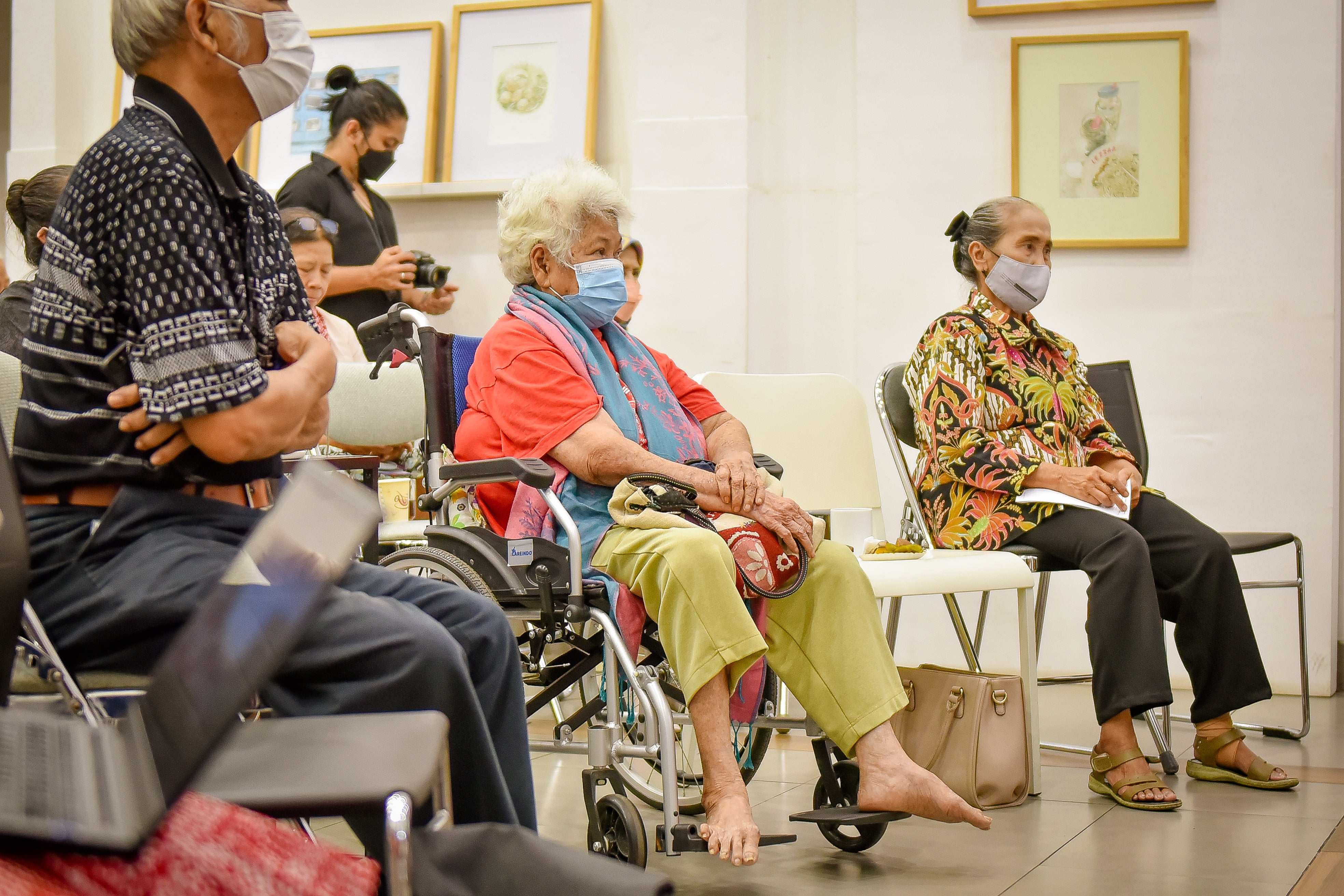
(Photo: Grady Kayzel/UNFPA Indonesia)
As the number of older persons with disability increases and the length of years with disability is expected to increase, the quantity of personnel and facilities to care for older persons need to be increased. “Programmes to train formal care workers and informal caregivers also need strengthening,” Mis Cicih emphasized.
Effectiveness of Policies to Protect Older Persons
The study discovered that as of February, 2022, 34 percent of older persons have not been vaccinated. Nearly 70 percent of those who were not vaccinated mentioned health conditions as the reason, while 21.8 percent others described that they were unwilling to be vaccinated partly because they thought the information conveyed about the pandemic and vaccination was “unclear, imprecise, absurd, and untrue”. The rest stated that they did not know that vaccination was necessary.
“Many health experts have stated that the vaccines are suitable for the majority of people, including those with comorbidity,” Mis Cicih said. “Thus, reassessment of individual health conditions is recommended for those who have not been vaccinated due to health reasons,” she continued. Information for older persons must also be factually accurate, targeted, and easy to understand.
Healthcare Utilization
The research indicated minimal impacts of COVID-19 on access to healthcare. “Only about three percent of older persons reported that they had some problems accessing healthcare services,” said Saito. “Three-quarters of older persons have not experienced delays or cancellations of health care services, and 21.6 percent of older persons have not needed to use healthcare services,” he described. On the other hand, the study found that among older persons needing medication, 15.5 percent of them have experienced some difficulties receiving their medicine during the pandemic.
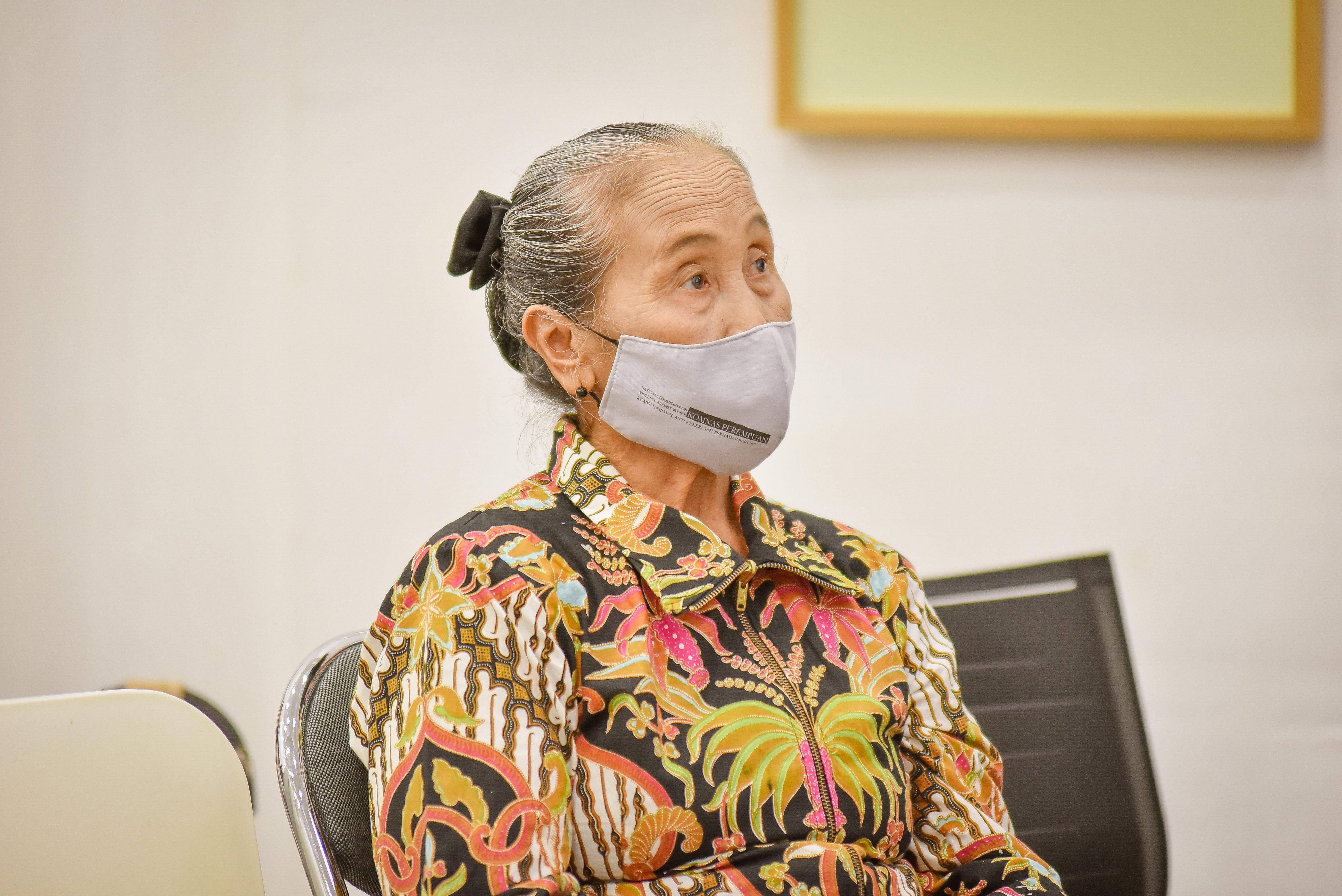
(Photo: Grady Kayzel/UNFPA Indonesia)
Nevertheless, ensuring that core general healthcare services continue to be made available easily, exploring ways to deliver medicines to those who have difficulties obtaining them, and promoting the use of telemedicine should remain a priority.
Assistance Received
Overall, the percentage of older persons reporting a decrease in assistance and support was much higher than the percentages of those reporting an increase. Around 29 percent older persons who have received support from the government, and 31 others who received support from non-government organizations (NGOs) and other organizations reported a decrease. Female older persons were the majority of respondents who reported decreased support.
“Government and NGOs need to investigate the reported decrease in support and formulate ways to increase it. In particular, women and the younger-old may need extra forms of support,” Saito added.
The study attempted to understand how COVID-19 has been affecting the lives of the older persons and found that older persons are not a homogeneous population with varying backgrounds and needs. “Policies targeting older persons may need to reconsider moving from treating older persons as a whole to focus more on differences by the characteristics of older persons such as by age group and their specific conditions,” Mis Cicih concluded.
“The study and analysis provide valuable policy recommendations in strengthening government response and informing the government program in inclusive development policies,” Anjali Sen assured. “We need to focus more on individual needs, rights, and choices, and come up with an individualization approach in programs and policies. That’s the way to move forward,” she affirmed.
*******
Asri Wijayanti
LNOB Programme Communications Consultant
